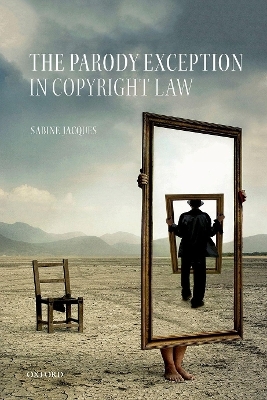
The Parody Exception in Copyright Law
Seiten
2019
Oxford University Press (Verlag)
978-0-19-880693-6 (ISBN)
Oxford University Press (Verlag)
978-0-19-880693-6 (ISBN)
This book offers a rigorous comparative, international, regional and national inquiry into the parody exception under copyright law, covering key jurisdictions such as the US, the UK, Canada, Australia, France and the EU.
Parodies have been created throughout times and cultures. A glimpse at the general judicial latitude generally afforded to parodies, satires, caricatures, and pastiches demonstrates the social and cultural value of this particular form of artistic expression. With the advent of technologies and the evolution of copyright legislation, creative endeavours in the form of parody gathered a new youth but became unlawful.
While copyright law grants exclusive rights to right-holders, this right is not absolute. Legislation includes specific exceptions, which preclude right-holders from exercising their prerogatives in particular cases which foster creativity and cultural diversity within that society. The parody exception pertains to this ultimate objective by permitting users to reproduce copyright-protected materials for the purpose of parody.
To understand the meaning and scope of the parody exception, this book examines and compares five jurisdictions which differ in their protection of parodies: France, Australia, Canada, the US and the United Kingdom. This book is concerned with finding an appropriate balance between the protection awarded to right-holders and the public interest. This is achieved by analysing the parody exception to the economic rights of right-holders, the preservation of moral rights and the interaction of the parody exception with contract law.
As parodies constitute an artistic expression protected under the right to freedom of expression, this book also considers the influence of freedom of expression on the interpretation of this specific copyright exception. Furthermore, this book aims at providing guidance on how to resolve conflicts where fundamental rights are in conflict.
This is the first book in English to offer an in-depth investigation into the parody exception in copyright law, and comments on industry practices linked to this form of creative endeavours.
Parodies have been created throughout times and cultures. A glimpse at the general judicial latitude generally afforded to parodies, satires, caricatures, and pastiches demonstrates the social and cultural value of this particular form of artistic expression. With the advent of technologies and the evolution of copyright legislation, creative endeavours in the form of parody gathered a new youth but became unlawful.
While copyright law grants exclusive rights to right-holders, this right is not absolute. Legislation includes specific exceptions, which preclude right-holders from exercising their prerogatives in particular cases which foster creativity and cultural diversity within that society. The parody exception pertains to this ultimate objective by permitting users to reproduce copyright-protected materials for the purpose of parody.
To understand the meaning and scope of the parody exception, this book examines and compares five jurisdictions which differ in their protection of parodies: France, Australia, Canada, the US and the United Kingdom. This book is concerned with finding an appropriate balance between the protection awarded to right-holders and the public interest. This is achieved by analysing the parody exception to the economic rights of right-holders, the preservation of moral rights and the interaction of the parody exception with contract law.
As parodies constitute an artistic expression protected under the right to freedom of expression, this book also considers the influence of freedom of expression on the interpretation of this specific copyright exception. Furthermore, this book aims at providing guidance on how to resolve conflicts where fundamental rights are in conflict.
This is the first book in English to offer an in-depth investigation into the parody exception in copyright law, and comments on industry practices linked to this form of creative endeavours.
Sabine Jacques is a senior lecturer in IP, IT, and Media Law.
1: Parody - Nature and Definition
2: Legality of the Parody Exception in Light of International Treaties and Domestic Copyright Laws
3: The Scope of the Parody Exception
4: Parody and Moral Rights
5: How Freedom of Expression Defines the Parody Exception
6: The Future of the Parody Exception - Outlook and Conclusions
| Erscheinungsdatum | 14.05.2019 |
|---|---|
| Verlagsort | Oxford |
| Sprache | englisch |
| Maße | 164 x 240 mm |
| Gewicht | 646 g |
| Themenwelt | Recht / Steuern ► EU / Internationales Recht |
| Recht / Steuern ► Wirtschaftsrecht ► Urheberrecht | |
| ISBN-10 | 0-19-880693-0 / 0198806930 |
| ISBN-13 | 978-0-19-880693-6 / 9780198806936 |
| Zustand | Neuware |
| Haben Sie eine Frage zum Produkt? |
Mehr entdecken
aus dem Bereich
aus dem Bereich
Gesetz gegen den unlauteren Wettbewerb, Preisangabenverordnung, …
Buch | Softcover (2024)
dtv Verlagsgesellschaft
CHF 23,65
Textausgabe zum deutschen, europäischen und internationalen Patent-, …
Buch | Softcover (2023)
dtv Verlagsgesellschaft
CHF 24,95


